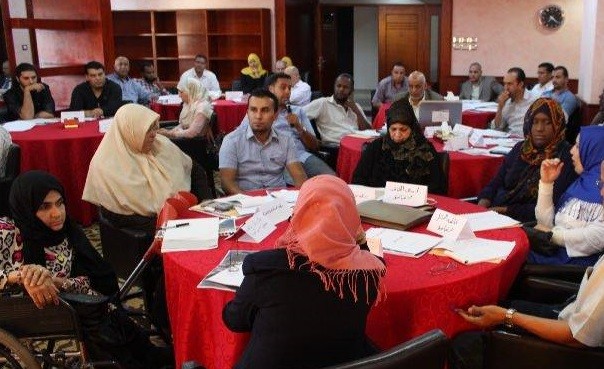Speeches Shim

Grantee: National Democratic Institute for International Affairs (NDI)
Project Title: Libya Elections and Governance Support (LEGS) program
Duration: Oct. 2012 – Sept. 2019 Project Amount: $10.5 million
OBJECTIVE
To provide assistance to Libyan government institutions and civil society organizations as they attempt to navigate the country’s transition from an authoritarian regime to a democratic system. NDI is providing assistance to newly created grassroots and civil society organizations (CSOs) that encourage broad public participation in the political process and elected institutions with the goal of increasing citizen engagement. NDI works with historically marginalized groups, including women, young people and ethnic minorities who are organizing to increase representation in Libyan politics.
PROGRAM ACTIVITIES
1. Provide training to Libya's national legislative bodies to include: leaderhsip, empowerment, negotiation skills, and consensus building skills;
2. Conduct training programs for civil society groups representing women, youth, disabled persons, and other marginalized segments of the population to develop the skills needed to advance their policy goals at the national and local government levels;
3. Provide support to organizations that observe domestic elections;
4. Distribute resource materials related to democratic development to a broad cross-section of civic leaders;
5. Raise awareness, understanding, and adoption of best practices to build strong democratic processes and institutions.
PROGRAM ACHIEVEMENTS
- Engaged policy-makers at a national level providing concrete recommendations on how to increase the political participation of previously marginalized groups (e.g., proposals establishing electoral and representation quotas for women and youth, facilitating access of persons with disabilities, and inclusion of native-language education for ethnic minorities);
- Provided support to parliamentarians and staff on their representation, executive oversight, and lawmaking duties, including developing online resources for distance learning;
- Conducted trainings with four networks of Libyan civil society organizations (CSOs) who together deployed 4,210 citizens to observe voting in three electoral events and a fifth that is preparing to field more than 1,800 observers in the anticipated constitutional referendum vote.
- Coordinated a meeting of 25 representatives of Libyan Tebu and Amazigh communities to identify common advocacy issues and areas of mutual support between the communities.
- In mid-2017, brought national and local politicians together with CSOs and youth activists to learn about peace-building and reconciliation, based upon the Northern Ireland experience;
- Organized roundtable discussions between parliamentarians and their constituents to provide a platform for citizens to directly communicate with elected representatives.

Comment
Make a general inquiry or suggest an improvement.